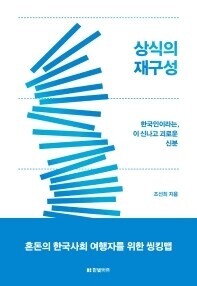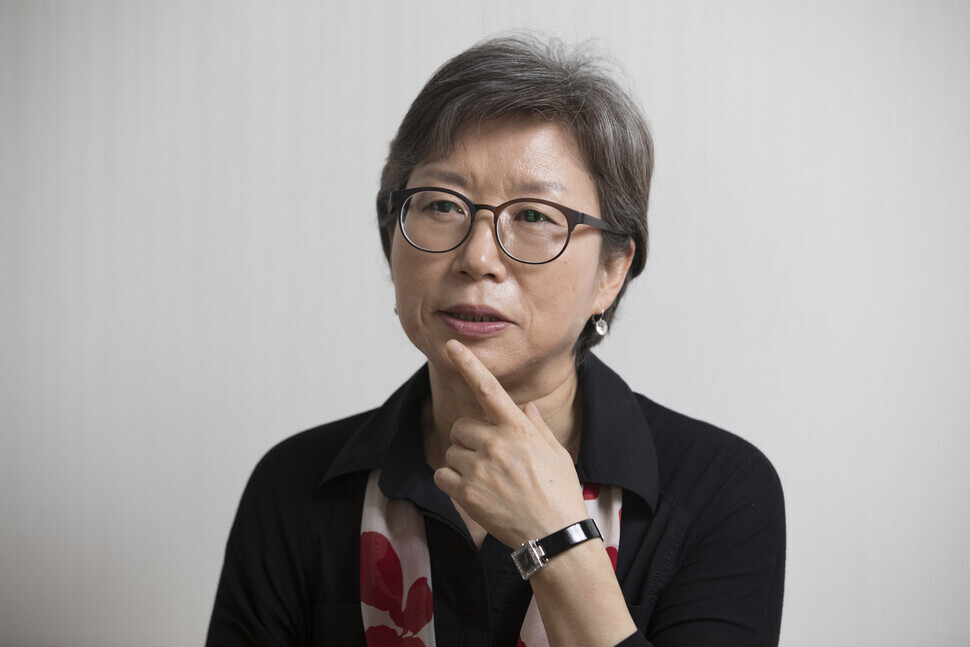hankyoreh
Links to other country sites 다른 나라 사이트 링크
[Book review] Cho Seon-hee offers roadmap to common sense in S. Korea’s era of divide, polarization

Some have reacted skeptically to the notion of Cho Seon-hee, author of the novel “Three Women,” writing a social science book. But they also realize it makes some sense when they consider that her career history includes the professions of journalist and arts and culture administration in addition to novelist.
She’s been there witnessing things on the ground as a reporter. As a senior official, she has learned the principles of central and local government operations.
Beyond that, the fact that she set her novel during the highest “stress index” period of the last century or so — the years from the occupation to liberation and the Korean War — could be seen as evidence that she is eminently qualified to offer the most trenchant diagnosis of our current situation.
It isn’t just about capability, however. In its vast length of some 550 pages, the book encompasses a complex mix of themes ranging from deepening inequality to media overload, democracy in crisis, left/right political conflicts, South Korea-Japan relations, and the mentality of South Koreans and their society.
You don’t attempt this sort of grand undertaking without a strong sense of urgency. While the book does not say so in so many words, it’s more than evident to those who read between the lines.
The project seems to have been set in motion by the situation that unfolded around the time that then-Minister of Justice Cho Kuk was being targeted for investigation by prosecutors. This “post-candlelight revolution” period ushered in a string of events that provoked such polarized discourse on the state, society and family that it could fairly be called a psychological Cold War.
Why are people so angry? How has South Korean society gotten so divided? Are there no possible solutions?
To answer these questions, Cho Seon-hee starts with an examination of what we believe to be “common sense.”
At the height of the Cho Kuk situation, the author was spending the period from October 2019 to April 2020 in Germany, which meant she was able to distance herself from all the noise coming in from Korea. In response, she pored through “over 100 different books,” and “Restructuring ‘Common Sense’” is the fruit of those labors.
To Cho Seon-hee, “common sense” starts with consideration not just of the dark aspects of South Korean society but also of the things we’ve been able to achieve over the years. She examines both the light and shadows of the “US$30,000 per capita national income” era — and the associated dilemmas.

For example, South Korea suffers from high levels of psychological fatigue, which has saddled it with the ignominy of ranking first among OECD nations for its suicide rate. Meanwhile, asset inequality worsens by the day, cementing in place a system of hereditary capitalism that plunges the majority — younger people especially — into despair.
What are the things that leave us so fatigued? They include partisan arguments that encourage over-identification with political issues; media that promote confirmation bias; a ballooning of prosecutorial authority that has eroded the principle of separation of powers; and academic competition so overheated that even gangster films have dialogue like “You need to be one of top 20 students schoolwide to join our organization.”
At the same time, Cho insists we also need to give credit where it is due — in terms of the way South Korea rose from the ashes of war to achieve astounding economic growth and in terms of our cultural industry development in particular.
According to her, South Korea’s disease control successes are worth bragging about, combining efficient administrative capabilities with the cooperation of the entire public. Going a step beyond simply encouraging the reader to consider South Korea’s international stature fairly, she goes so far as to exonerate the media for their “cultural cheerleading.”
The book reads a bit breathlessly, zigzagging as it does through so many different topics. But Cho has a convincing argument to share with an over-adrenalized South Korean society:
“Now that we’ve passed through the steep and dizzying liftoff period and reached a high altitude, it’s safe for us to cautiously unfasten our safety belts and make a stop in the restroom.”
By Lee Ju-hyeon, staff reporter
Please direct comments or questions to [english@hani.co.kr]

Editorial・opinion
![[Editorial] Korea must respond firmly to Japan’s attempt to usurp Line [Editorial] Korea must respond firmly to Japan’s attempt to usurp Line](https://flexible.img.hani.co.kr/flexible/normal/500/300/imgdb/original/2024/0514/2317156736305813.jpg) [Editorial] Korea must respond firmly to Japan’s attempt to usurp Line
[Editorial] Korea must respond firmly to Japan’s attempt to usurp Line![[Editorial] Transfers of prosecutors investigating Korea’s first lady send chilling message [Editorial] Transfers of prosecutors investigating Korea’s first lady send chilling message](https://flexible.img.hani.co.kr/flexible/normal/500/300/imgdb/original/2024/0514/7917156741888668.jpg) [Editorial] Transfers of prosecutors investigating Korea’s first lady send chilling message
[Editorial] Transfers of prosecutors investigating Korea’s first lady send chilling message- [Column] Will Seoul’s ties with Moscow really recover on their own?
- [Column] Samsung’s ‘lost decade’ and Lee Jae-yong’s mismatched chopsticks
- [Correspondent’s column] The real reason the US is worried about Chinese ‘overcapacity’
- [Editorial] Yoon’s gesture at communication only highlights his reluctance to change
- [Editorial] Perilous stakes of Trump’s rhetoric around US troop pullout from Korea
- [Guest essay] Preventing Korean Peninsula from becoming front line of new cold war
- [Column] The state is back — but is it in business?
- [Column] Life on our Trisolaris
Most viewed articles
- 1[Editorial] Transfers of prosecutors investigating Korea’s first lady send chilling message
- 2Korea cedes No. 1 spot in overall shipbuilding competitiveness to China
- 3Major personnel shuffle reassigns prosecutors leading investigations into Korea’s first lady
- 4[Editorial] Korea must respond firmly to Japan’s attempt to usurp Line
- 5US has always pulled troops from Korea unilaterally — is Yoon prepared for it to happen again?
- 6Second suspect nabbed for gruesome murder of Korean in Thailand, 1 remains at large
- 7Naver’s union calls for action from government over possible Japanese buyout of Line
- 8Korean auto industry on edge after US hints at ban on Chinese tech in connected cars
- 9[Correspondent’s column] The real reason the US is worried about Chinese ‘overcapacity’
- 10[Column] Samsung’s ‘lost decade’ and Lee Jae-yong’s mismatched chopsticks